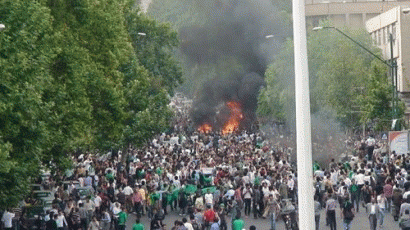Hear Abbas Sadeghian and Paul Craig Roberts on the Rob Kall Radio Show tonight, Wed. June 17
flickr image by faramarz
Between Twitter, isolated reports from the media and live blogging, particularly by Nico Pitney of huffingtonpost, it is clear that things are becoming not only more chaotic in Iran, but also that more are getting involved in the protests.
Twitter has become a major tool, even a "weapon," used by protesters to keep the rest of the world informed as the Iranian government has cracked down on all efforts to report on and cover the protests.
A Twitterer reports that troops are entering Tehran.
Another Twitterer tweets that foreign journalists have been warned they will be arrested if they report what is happening on the streets.
Pitney cites the NY Times,
The latest from Roger Cohen of the New York Times, who has been in Iran since before the election.
For the first time, I saw traffic police smiling at the crowd. Even the black-clad elite riot police were impassive. "Raise your arms, raise your arms," one man murmured to them.If the regime had hoped to quell Iran's powerful democratic stirring with a massive show of force since last Friday's vote, it failed to do so.
For the first time, in that crowd, it seemed to me that the forces of change, the deeper Iran of civility and courage that I first encountered several months ago, might prevail. Seldom has silence been more eloquent or potent. [...]
Many women are trying quietly to bridge the chasm and avoid the worst. I've heard them whispering to the Basij and the police that "We are all Iranians," urging them to hold back.
As Pepe Escobar reports in Asia Times, this is no longer about who won the election.
This has nothing to do with the US-supported color-coded revolutions in Eurasia. This is about Iran. An election was stolen in the United Statesin 2000 and Americans didn't do a thing about it. Iranians are willing to die to have their votes counted. There is now an opening for a true Iranian people-power movement not specifically to the benefit of Mousavi, but with Mousavi as the catalyst in a wider struggle for real democratic legitimacy. The die is cast; now it's people power against "divine assessment".
The true power struggle in Iran could ultimately be between Khameni and Rafsanjani. Escobar explains,
Rafsanjani is the de facto number two most powerful player in the Iranian system, and has been so for more than 20 years now. He controls the Expediency Council and the Council of Experts (which has the power to depose the Supreme Leader). The IRGC fear him and are against him. It's no secret that those that really matter in the Iranian system are the top mullahcracy and the IRGC. (The name says it all; they are the guardians of the whole idea of the revolution. And they only respond to the Supreme Leader.)
(Note: You can view every article as one long page if you sign up as an Advocate Member, or higher).






